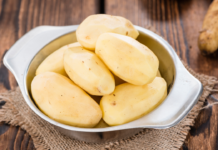Sponsored by: Renadyl™
Kellsey Reed RDN, LDN
With Valentine’s Day chocolate treats lining the aisles, there are so many options! Milk, white, dark, salted caramel, raspberry…there are so many types and flavors of chocolates to choose from! How do you know which one to choose when you have CKD? Enjoying chocolate when you have CKD is often thought of as taboo. Many websites will tell you chocolate has too much sugar or fat, making chocolate seem completely off limits for those with CKD. Chocolate can be enjoyed on a kidney friendly diet but there are a few things to keep in mind. Some types of chocolate even contain fiber, which can be incredibly beneficial for those with CKD.
Fiber 101
Fiber is a nutrient, a carbohydrate, that goes undigested. There are two types of fiber: insoluble and soluble. Insoluble fiber helps to move things through your digestive tract to help you go to the bathroom regularly. Soluble fiber helps to better control blood sugars and cholesterol levels. Both of these types of fiber are equally as important for our overall health. By including more fiber in your diet, you can better help to manage cholesterol, blood sugars, appetite, gut health, and inflammation levels in your body. Increasing your fiber intake can also help to decrease your risk of disease as well! But which foods are high in fiber?
Insoluble fiber-rich foods include:
- Whole wheat products
- Quinoa
- Legumes
- Leafy greens
- Nuts and seeds
- Pears and apple
- Cauliflower
- Green beans
- Potatoes
Soluble fiber-rich foods include:
- Oatmeal
- Chia seeds
- Nuts
- Beans
- Lentils
- Apples
- Blueberries
- Sweet potatoes
- Brussels sprouts
- Carrots
- Dried fruits
- Psyllium husk
As you can see, fiber is a powerhouse nutrient for everyone. For those with CKD, it can be even more beneficial than we might think.
Fiber & CKD
Studies show that our gut health is linked to our kidney health because gut-derived uremic toxins are associated with the progression of CKD, cardiovascular disease, and mortality. When you have CKD, toxins and waste products can build up in the body and become harmful. This buildup can result in further progression of CKD.
Increasing your fiber intake and focusing on good gut health can help to reduce the amount of toxins and waste products in the body & therefore help to slow the progression of CKD. It can also help keep your bowel movements regular, especially if you are used to experiencing constipation. Increasing your fiber intake with CKD can also allow you to protect your heart health and better manage your blood sugars, which has a profound effect on overall kidney health. If you are protecting your gut health, then you can help protect your kidney health in turn.
Fiber’s role in gut health
Fiber plays a crucial role in our gut health and gut microbiome. This powerful nutrient helps improve gut health by:
- Increasing stool output, weight, and frequency which then in turn helps to strengthen colonic mucosal health
- Changing the balance of microbes and metabolites
- Reducing fat absorption and sugar absorption
- Decreasing your risk of colon cancer, diabetes, cardiovascular disease, and inflammatory bowel disease
Increasing your fiber intake should be a slow and steady process to ensure that you are tolerating the extra fiber well. In order to add more fiber to your diet, you can increase your intake of fruits, vegetables, nuts, seeds, legumes, and whole grains.
Chocolate 101
Creamy, silky, and smooth, chocolate can satisfy our sweet tooth and provide our soul with some much needed nourishment. But aside from being a comfort food to many, chocolate can also provide many health benefits to those with CKD. Studies show that chocolate contains compounds called polyphenols that help to protect our immune system and provide us with antioxidants. These polyphenols have been shown to even enhance the absorption of good gut bacteria in our body, aiding even further our gut health. Some chocolate, like dark chocolate, contains fiber, which is so beneficial for overall kidney health too.
Different types of chocolates also contain different nutrients. When you have CKD, keeping in mind certain nutrients like protein, potassium, phosphorus, sodium, sugar, and fiber can be helpful for managing your kidney health. For example, dark chocolate typically contains more fiber and potassium than milk or white chocolate. White chocolate typically contains more sugars than milk and dark chocolate. See below for more information about the different types of chocolate.
Milk chocolate (per 1 ounce)-
Calories – 157 calories
Protein – 2.2 gm
Sodium – 25 mg
Potassium – 107 mg
Phosphorus – 60 mg (naturally occurring phosphorus, not phosphate additives)
Fiber – 1 gm
Carbohydrates – 18 gm
Sugars – 14 gm
Fat – 9 gm
Dark chocolate (per 1 ounce)-
Calories – 170 calories
Protein – 2.2 gm
Sodium – 5 mg
Potassium – 150-200 mg
Phosphorus – 87 mg (naturally occurring phosphorus, not phosphate additives)
Fiber – 3 gm
Carbohydrates – 13 gm
Sugars – 6.8 gm
Fat – 12 gm
White chocolate (per 1 ounce)-
Calories – 160 calories
Protein – 2 gm
Sodium – 30 mg
Potassium – 81 mg
Phosphorus – 50 mg (naturally occurring phosphorus, not phosphate additives)
Fiber – 0 gm
Carbohydrates – 17 gm
Sugars – 15 gm
Fat – 9 gm
Enjoying chocolate on a kidney-friendly diet is 100% doable, but it’s important to keep your nutrient needs in mind. Chocolate contains saturated fats and sugar which are not helpful in excess. However, dark chocolate also contains some fiber which is helpful for our kidney health! For example, if you need a lower potassium diet, maybe choosing white or milk chocolate is a better option. If you are looking to find a more blood sugar-friendly option, maybe dark chocolate is a better option. Portion size is key when it comes to chocolate because of the nutrition that we get from it. Try being mindful of portion size next time you are enjoying your next chocolate treat.
Chocolate recommendations for those with CKD
Here are a few chocolate recommendations that can fit into your kidney friendly diet and provide you with some beneficial fiber!
-Enjoy life chocolate treats
-Lilly’s chocolate chips or chocolate bars
-Lindt 70% Dark Chocolate Bar
-Ghirardelli Chocolate Company Intense Dark 86% Cacao Dark Chocolate
-Dove dark chocolates
The bottom line
Fiber plays an important role in managing gut health and kidney health and should be included on a regular basis from a variety of foods. When it comes to chocolate, being mindful of your portion size can be helpful. That may sound cliché, but it’s true! Any nutrient in excess is not beneficial for anyone, let alone those with CKD. Overall, dark chocolate is often higher in fiber and lower in sugar, which can be more beneficial for those with CKD. So, choosing chocolate that you love in a mindful way can help you fit it into your kidney friendly diet. What is your favorite chocolate treat?
About the Author
Kellsey Reed is a kidney dietitian. She helps people with CKD learn to eat the foods they love so they can improve their kidney health and live their best life with CKD. As a registered dietitian who specializes in chronic kidney disease, she has been through extensive training to give you the best support and guidance possible. In her career, she’s seen the lack of support given to those with CKD and is on a mission to change that.
“I don’t believe in just giving you a one-page handout that says “eat this” and “don’t eat that”. I don’t believe in telling you to stop going out to eat! I don’t believe in having you cut out all the foods you love in order to manage your CKD! I believe in giving you all of the tools, resources, and support that you need to eat for your CKD with 100% confidence! I believe in helping you learn how to travel, go out to eat at your favorite restaurants, have a date night with your spouse, and celebrate holidays and birthdays with your family without stress, anxiety, or confusion!”
If you’re interested in learning more about Kellsey’s coaching program or the free resources she offers, go to her website: ckdnutrition.com. You can also follow along on Instagram or TikTok at: @ckd.nutrition.coach!
References
- https://pubmed.ncbi.nlm.nih.gov/32718711/
- https://www.ncbi.nlm.nih.gov/pmc/articles/PMC7400387/
- https://www.ncbi.nlm.nih.gov/pmc/articles/PMC3566565/
- https://www.ncbi.nlm.nih.gov/pmc/articles/PMC6855949/#:~:text=Diets%20high%20in%20fruits%20and,and%20low%20in%20animal%20protein.
- https://academic.oup.com/ckj/article/15/2/213/6370147
- https://www.healthline.com/nutrition/foods-high-in-soluble-fiber#13.-Carrots
*These statements have not been evaluated by the US Food and Drug Administration. This information is not intended to diagnose, treat, cure, or prevent any disease. Always consult with a qualified healthcare professional prior to beginning any diet or exercise program or taking any dietary supplement. The content on our website is for informational and educational purposes only.




